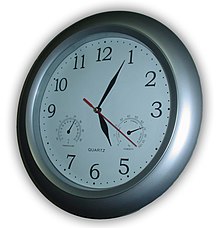This article does not have any sources. (February 2022) |
A clock is a device that tells the time. Some clocks can only show the time. Other clocks can show other things. For example, some clocks can show the date as well as the time, or show other information, like the timer temperature or the weather, some have stopwatch and some have alarm.

Keeping time
changeClocks use different ways to measure time. Clocks need some sort of steady beat or motion to track the change in time. Ancient water clocks worked by the steady movement of water from a container with a hole in the bottom to another container without a hole. Other clocks use pendulums, springs and gears to track the change in time correctly.
Digital clocks work by measuring the vibrations of quartz crystals when charged with electricity. The vibration frequency of the crystal does not change.
Atomic clocks use the electromagnetic waves absorbed and emitted by atoms such as caesium to measure time. They are the most precise clocks in the world.watch image
Clock displays
changeThe two most common types of displays on clocks are "analog" and "digital".
Analog clocks
changeAnalog clocks use angles to tell time. They have hands that rotate around the clock's face (the front of the clock). The position of the hands shows the time. The face of the clock is a flat disk. It will often have the numbers one through twelve on the face to make it easier to read. Analog clocks commonly have two or three hands. If it has two, there is a large hand or minute hand and a smaller hand, the hour hand. Clocks with three hands also have a second hand. This hand is usually about as long as the minute hand, but much thinner.
Each hand shows the time it is named for and moves around the face of the clock one complete rotation for each movement to the next larger hand. For example, the second hand moves around the face of the clock in 60 seconds. It moves once each second. When it moves all the way around the clock, the minute hand moves forward one space. When the minute hand moves all the way around the face of the clock (which takes 60 minutes), the hour hand moves forward one section. The second and minute hands take 60 movements to move all around the face of the clock. The hour hand only needs 12 movements to do the same.
Digital clocks
changeDigital clocks use numbers to show the time. LCDs and LEDs are common for digital clocks. Unlike analog clocks which are based on 12 hours, digital clocks can use either a 12-hour clock (often with am for morning and pm for afternoon/night) or a 24-hour clock. Digital clocks are usually smaller and easier to both use and read than analog clocks but they can also be made much larger. New digital clocks can even correct themselves using the internet or radio signals.
Sounds
changeThere are also clocks that use sound, usually along with a dial or some other means, to show the time. The sound could be as simple as a bell or so complex that it sounds the same as a person. Many clocks that do this are old and are driven by springs or weights rather than batteries or other forms of electric power. Some special clocks are often used by people who are blind or cannot see well enough to read an analog or digital clock. They can also be used by people with mental problems that cause them to be unable to read other clocks.
Types of clocks
changeThere are many different types of clocks and watches. They are different in what they are used for, what they can do or how they are made. Examples include:
- A watch, also called a watch, is worn on the wrist. It is held in place by two straps connected to the watch, and then wrapped around the wrist and connected to each other.
- A pocket watch is kept in a pocket. It usually has a small chainor a chain like cloth which is connected to the person's clothing. This helps people to not lose the watch.
- A radio (controlled) clock is automatically synchronized to a time, transmitted by a radio transmitter. JUNGHANS MEGA is the name of the world's first radio-controlled wristwatch with hands.
- A sundial is an old form of a clock which uses the Sun to tell time.
- An alarm clock is a clock that makes a sound (often a buzzing or a bell-like sound) or plays music at a certain time. It is used by people to wake up from sleep at a time they choose.
- A grandfather clock is a tall clock that stands on a floor. It uses a pendulum to tell time.
- A cuckoo clock is a pendulum based clock which makes a sound each hour on the hour. They often also have a small door. When the clock makes the sound, the door opens and a small toy bird or other item usually comes out of the door.
- An hourglass, also called a sandglass or sand timer, uses sand trickling slowly to measure time.